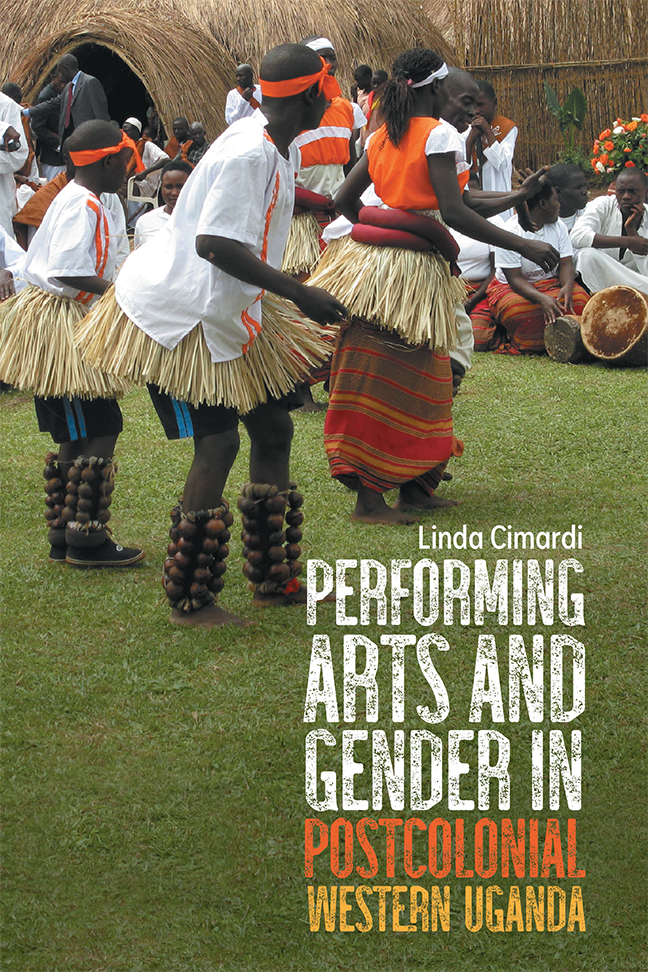Book contents
- Frontmatter
- Contents
- List of Illustrations
- Foreword
- Acknowledgments
- Note on Language
- Note on the Musical Examples
- Note on Online Audio and Video Material
- Prelude: Encountering Local Culture in Western Uganda
- Introduction: Approaching Gender and Performing Arts in Bunyoro and Tooro
- One “Traditional Dance Preserves Culture and Shows People How to Behave”: Runyege, MDD, and Gender
- Two Singing Marriage, Runyege, and Labor
- Three “Women Aren't Supposed To”: Instrument Playing in the Past and Today
- Four Shaking the Hips, Stamping the Feet: The Runyege Dance
- Five Narrating and Representing Local Culture: Theater in Songs and Dances
- Six Trans-Performing and Morality in Cultural Groups
- Postlude: Gendering Culture
- I Glossary of Terms in Runyoro-Rutooro
- II Historical Recordings from Bunyoro and Tooro
- Author's Interviews
- References
- Index
Two - Singing Marriage, Runyege, and Labor
Published online by Cambridge University Press: 17 December 2023
- Frontmatter
- Contents
- List of Illustrations
- Foreword
- Acknowledgments
- Note on Language
- Note on the Musical Examples
- Note on Online Audio and Video Material
- Prelude: Encountering Local Culture in Western Uganda
- Introduction: Approaching Gender and Performing Arts in Bunyoro and Tooro
- One “Traditional Dance Preserves Culture and Shows People How to Behave”: Runyege, MDD, and Gender
- Two Singing Marriage, Runyege, and Labor
- Three “Women Aren't Supposed To”: Instrument Playing in the Past and Today
- Four Shaking the Hips, Stamping the Feet: The Runyege Dance
- Five Narrating and Representing Local Culture: Theater in Songs and Dances
- Six Trans-Performing and Morality in Cultural Groups
- Postlude: Gendering Culture
- I Glossary of Terms in Runyoro-Rutooro
- II Historical Recordings from Bunyoro and Tooro
- Author's Interviews
- References
- Index
Summary
In 2011, Gerrison Kinyoro and Stephen Mugabo performed—respectively as solo (S) and chorus (C)—this song (A1), which is typically used in runyege, to illustrate how different topics could be simply juxtaposed, especially when the chorus did not convey a specific meaning (here it is just vocalized singing). Because of the lively community dimension of runyege performances of the past, extemporaneous variations in solo lyrics were needed to keep the performance interesting. So the soloist usually developed the first verses by drawing inspiration from the performance context, but they could also make reference to current news or quote proverbs. In some cases, they could do this within the same song, jumping from one subject to another while maintaining the same melody, as is the case in this song.
The first part (Kaisiki ija otongole…) evokes the context of the runyege dance: the singer invites a girl to dance, promising her a small present and urging her to enjoy the dance, otherwise he will not talk to her. That the solo voice is a male one is clear because the dancing partner is of the opposite sex (kaisiki, girl) as runyege gendered dance parts prescribe; furthermore, it is the male dancers that take the initiative, choose, and win over their dance partners. The female dancer was expected to smile shyly and to accept the invitation to dance, as the lyrics describe. Kinyoro pointed out that, in this case, this invitation is also, implicitly, an invitation to become a couple outside of the dance (int. May 11, 2011 and August 31, 2018). This kind of allusive reference to sexuality would be understood by the performers and the spectators. The second part of the song (Kinyantale…) suddenly shifts the theme and reports a topical occurrence. A wealthy man called Zaliya had firewood ready to be collected, but nobody took it. Kinyoro explained to me that this is an allegoric way of speaking (ruhenda) and is usually used to covertly express criticism or to refer to sex, things that were perceived as offensive, inappropriate, or vulgar. In this song, the dried wood alludes to Zaliya's daughters, who were ready for marriage, but he did not want them to get married, and so they remained at the paternal house. According to Kinyoro, runyege singers used ruhenda expressions in order to criticize people who might be present or to make sexual allusions.
- Type
- Chapter
- Information
- Performing Arts and Gender in Postcolonial Western Uganda , pp. 64 - 100Publisher: Boydell & BrewerPrint publication year: 2023

